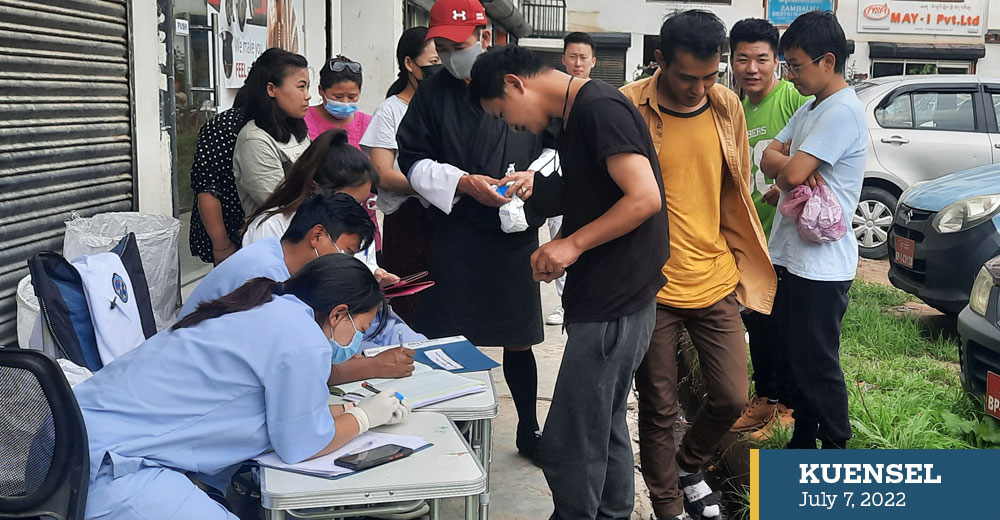Nima Wangdi
Some 70,000 people are on triple therapy medication after testing positive to H.Pylori bacteria during the ongoing nationwide screening campaign.
Health ministry officials said that this constitutes about 37 percent of the total 200,000 samples tested for the bacteria as of June 30. The campaign is underway in around 16 dzongkhags including Thimphu. In the remaining dzongkhags like Samdrup Jongkhar, Chukha, Samtse, and Paro, the campaign will be conducted during this fiscal year.
The campaign which started in 2020 is part of the government’s health flagship programme which is focused on stomach, cervical and breast cancers.
Health flagship programme manager, Pempa said that the first phase of screening in these dzongkhags has been completed. “This second phase is being organised to ensure 100 percent screening and those who were on medication were followed up.”
People who tested positive should complete a 14-day medication course. The cases will be followed up three months after completion of the medication.
Health officials said that the H.Pylori bacteria is one of the main causes of stomach cancer and that they were working toward eradicating it. People in the age group of 18-75 should get tested according to the health officials.
Pempa said that people between the ages of 40-75 and with the risk factors like H.Pylori, stomach ache history in the family, smokers and drinkers are also given endoscopy services in camps. “Endoscopy follows H.Pylori screening and some 40,000 people have received the service until June end.”
In Thimphu, there are two programs of screening going on. Jigme Dorji Wangchuck National Referral Hospital (JDWNRH) is conducting one and the thromde conducting the other. JDWRNH’s program starts from 2:30pm until 9pm while thromde’s screening starts from 9am until 5pm and it will continue until July 23.
Likewise, cervical cancer and breast cancer screenings are also underway. They are being rolled out in 10 dzongkhags namely Bumthang, Haa, Pemagatshel, Samtse, Trashigang, Thimphu, Tashiyangtse, Trongsa, Wangdue and Zhemgang. The rest of the dzongkhags will be covered in the current fiscal year and the women between the ages of 30 and 65 should get tested.
Pempa said that women, who test positive for Human Papillomavirus (HPV), which is the leading cause of cervical cancer are given the required treatment.
He said that breast cancer examinations are only for women aged between 40 and 65. “If anyone is found with the risk of developing breast cancer, the person is provided with further examination and treatment like mammography.”
According to Pempa, the camps are aimed at detecting early and precancers that can be treated. He said the people should come forward for the screening when the service is brought to their doorsteps. “The screening is expected to be complete by 2023.”
“If people come to the hospital after the camp is over they will have to wait,” Pempa said.
Bhutan Cancer Control Strategy 2019-2025 states that cancer is a growing public health problem in Bhutan. The top five cancers for 2014-2018 were cervical, stomach, head and neck, lung and oesophagus. Breast cancer stands third among women.
Cancer is a leading cause of death worldwide. An estimated 9.6 million deaths occurred from cancers in 2018 and are projected to rise to over 13.1 million by 2030.
Global patterns of 2018 showed that nearly half of the new cases and more than half of the cancer deaths worldwide are estimated to occur in Asia as the region has nearly 60 percent of the global population according to online sources.


